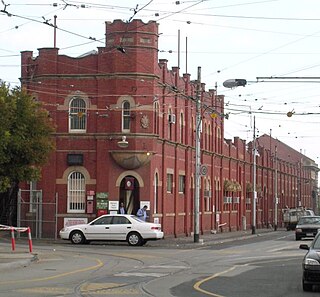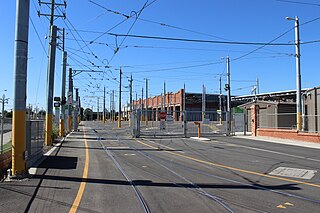
Bourke Street is one of the main streets in the Melbourne central business district and a core feature of the Hoddle Grid. It was traditionally the entertainment hub of inner-city Melbourne, and is now also a popular tourist destination and tram thoroughfare.

Melbourne tram route 96 is operated by Yarra Trams on the Melbourne tram network from Brunswick East to St Kilda Beach. The 13.9 kilometre route is operated out of Southbank depot with C2, E class, and on occasion A class trams.

Melbourne tram route 75 is operated by Yarra Trams on the Melbourne tram network from Vermont South to Central Pier. The 22.8 kilometre route is operated out of Camberwell depot with A and B class trams. It is the longest route on the network.

Melbourne tram route 70 is operated by Yarra Trams on the Melbourne tram network from Waterfront City to Wattle Park. The 16.5 kilometre route is operated out of Camberwell depot with A and B class trams.

Melbourne tram route 109 is operated by Yarra Trams on the Melbourne tram network from Box Hill to Port Melbourne. The 19.3 kilometre route is operated out of Kew depot with A and C class trams.

The A-class Melbourne tram is a class of bogie trams that operate on the Melbourne tram network. Seventy were built by Comeng, Dandenong between 1984 and 1987 in two batches, 28 A1s and 42 A2s, with only minor differences. They are the smallest trams by capacity currently operating on the network.

Melbourne tram route 86 is operated by Yarra Trams on the Melbourne tram network from Bundoora RMIT to Waterfront City. The 22.2-kilometre (13.8 mi) route is operated out of Preston depot with E class trams.

Melbourne tram route 48 is operated by Yarra Trams on the Melbourne tram network from Balwyn North to Victoria Harbour. The 13.5-kilometre (8.4 mi) route is operated out of Kew depot with A and C class trams.

Melbourne tram route 11 is operated by Yarra Trams on the Melbourne tram network from West Preston to Victoria Harbour. The 13.4-kilometre (8.3 mi) route is operated out of Preston depot with E class trams.

The Melbourne & Metropolitan Tramways Board (MMTB) was a government-owned authority that was responsible for the tram network in Melbourne, Australia between 1919 and 1983, when it was merged into the Metropolitan Transit Authority. It had been formed by the merger of a number of smaller tramway trusts and companies that operated throughout the city.

Malvern tram depot is located in Coldblo Road, Armadale, Victoria, a suburb of Stonnington, Australia. Operated by Yarra Trams, it is one of eight tram depots on the Melbourne tram network.

The Z-class are single-unit bogie trams that operate on the Melbourne tram network. Between 1975 and 1983, 230 trams spanning three sub-classes were built by Comeng, Dandenong. The design was based on two similar Gothenburg tram models, and a prototype built by the Melbourne & Metropolitan Tramways Board. While the Z1 and Z2-class trams were very similar, the Z3-class had significant design changes.

The W-class trams are a family of electric trams built by the Melbourne & Metropolitan Tramways Board (MMTB) between 1923 and 1956. Over the 33 years of production, 752 vehicles spanning 12 sub-classes were constructed, the majority at the MMTB's Preston Workshops.

Kew tram depot is located on the corner of Barkers Road and High Street, Kew, a suburb of Melbourne, Australia. Operated by Yarra Trams, it is one of eight tram depots on the Melbourne tram network.

Camberwell tram depot is located on Council Street, Hawthorn East, a suburb of Melbourne, Australia. Opened in December 1929, it is operated by Yarra Trams. It is one of eight tram depots on the Melbourne tram network.

Brunswick tram depot is located on Sydney Road, Brunswick, a suburb of Melbourne, Australia. It opened on 26 April 1936 in conjunction with the electrification of the Brunswick and North Melbourne Cable tram line. Operated by Yarra Trams, it is one of eight tram depots on the Melbourne tram network.

Preston Workshops is the heavy maintenance facility for the Melbourne tram network. The workshop is located on a block surrounded by Miller Street, St George's Road, Oakover Road and the Mernda railway line in Preston, a suburb of Melbourne, Australia. Following a major redevelopment in April 2016, it also became an operational depot under the name New Preston Depot, taking over from East Preston.

North Fitzroy tram depot was a depot on the Melbourne tram network. Located on Nicholson Street, North Fitzroy, it opened in 1956 when the Melbourne & Metropolitan Tramways Board converted part of its North Fitzroy bus depot for tramway operation when the Bourke Street to Brunswick East line reopened. In 1976 it became a sub-unit of East Preston depot. It was the smallest tram depot in Melbourne.
The Fitzroy, Northcote & Preston Tramways Trust was a tram operator in Melbourne, Australia.
The Melbourne tram network began in 1884 with the construction of the Fairfield Horse Tramway. However, the purpose of the line was to increase land prices in the area, and it soon closed during the depression in 1890. The first genuine attempt to construct a tramway network was the construction of the Richmond cable tram line by the Melbourne Tramway & Omnibus Company in 1885. Over the next few years, 16 more cable tram lines were constructed, as well as numerous other horse tramways. The depression of the early 1890s slowed further expansion of the cable network. The first electric tram line was the Box Hill and Doncaster tramway which opened in 1889. This was a pioneering line in what was then the countryside and thus didn't receive much patronage. It closed in 1896. The next attempt at an electric tramway was Victorian Railways' St Kilda to Brighton line, which opened in 1906. Later that year, the North Melbourne Electric Tramway & Lighting Company opened lines to Essendon and Maribyrnong. Many local councils formed their own tramway trusts and built tramways within their own constituency. The most successful of these was the Prahran & Malvern Tramways Trust.



















